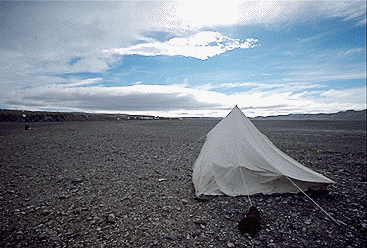

"The landscape conveys an impression of absolute permanence. It is not hostile. It is simply there untouched, silent, and complete. It is very lonely, yet the absence of all human traces gives you the feeling you understand this land and can take your place in it."
Edmund Carpenter, quoted in Arctic Dreams, frontpiece

[You feel] "intimacy with the "earth", being close to the "earth" (p. 40)

"Without the holler of contemporary life that constant disturbance, it is possible to feel the slope of time, how very far from Mesopotamia we have come." (p. 172)

"You can sit for a long time with the history of man like a stone in your hand. The stillness, the pure light, encourage it." (p. 173)

"We desire not merely to know what is beautiful and edifying in a faraway place. Considering the tradition of distant travelers, the range of their interests and the range of their countrymen's desire to know, the government camp on Cornwallis Island seemed an impoverished outpost. There were no provisions there for painters, for musicians, for novelists. And there no historians there. If the quest for knowledge in any remote place is meant in an egalitarian sense to be useful for all, then this is a peculiar situation. Yet it is no different from what one would find in a hundred other such remote places around the world. Whenever we seek to take swift and efficient possession of places completely new to us, places we neither own nor understand, our first and often only assessment is a scientific one. And so our evaluations remain unfinished." (p. 228)

"The people who first came into the Arctic had no photograph of the far shore before they left. They sailed in crude ships with cruder tools of navigation, and with maps that had no foundation or geographic authority. They shipwrecked so often that it is difficult to find records of their deaths, because shipwreck and death were unremarkable at the time. Their courage and determination in some instances was so extreme as to seem eerie and peculiar rather than heroic. Visions of achievement drove them on." (p. 308)

"What every culture must eventually decide, actively debate and decide, is what of all that surrounds it, tangible and intangible, it will dismantle and turn into material wealth. And what of its cultural wealth, from the tradition of finding peace in the vision of an undisturbed hillside to a knowledge of how to finance a corporate merger, it will fight to preserve." (p. 313)

"Parry wrote of the pleasure of staring at a stone
in the snow, for the relief it gave the eye." (p. 351)

"The land, whatever its attributes, is made to fill a certain role, often that of an adversary, the bête noire of one's dreams." (p. 358)

"The search for Franklin caught England's imagination as Barrow's quest for the Northwest Passage never had." (p. 363)

"The beauty here is beauty you feel in your flesh. You feel it physically, and that is why it is sometimes terrifying to approach. Other beauty only takes the heart, not the mind. I lost for long moments my sense of time and purpose as a human being." (p. 404)